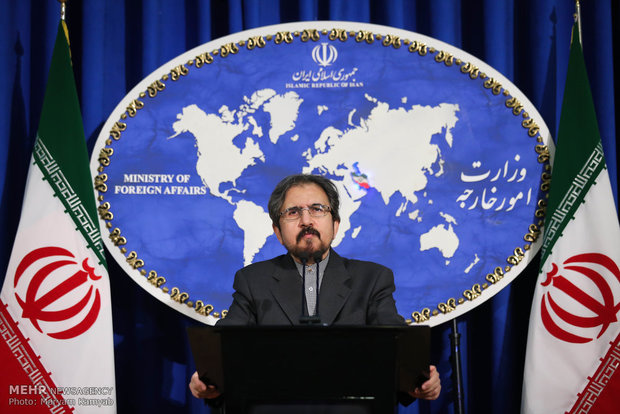Mr. Bahram Ghasemi’s press conference on Monday highlighted the importance of the JCPOA where the Europeans had been rejoicing the openings to Iranian economy post-JCPOA implementation. “They welcome a living JCPOA; the frequenting to Tehran of many European delegations especially of trade provides positive indications that they would benefit from the JCPOA than from its undermining,” Ghasemi told the press. “Thus, the Europeans will work to keep the deal working.”
On Bahrain situation and crackdown on majority Shia revolutionary public, spokesperson recommended the regime in Manama to review its failing policy in pursuit of mollifying the revolutionaries; “the regime should work with revolutionaries in hitting a deal where the country could emerge unscathed from the conflicts between citizens and the oppressive rulers of Al-Khalifa,” he added, avoiding any comment on the time of Sheikh Isa Qassim’s trial.
“Iran will definitely show a proper reaction to the Bahraini regime and currently, we watch the situation in the island closely to see if the regime has a willingness to show flexibility in its position,” Ghasemi said.
No less important was Syrian talks in Astana to be held later in March in Kazakhstan; “Astana talks is slated to be held before Geneva session; we wait to see what would be the outcomes of the talks,” added the spokesperson briefly.
Ghasemi also said that President Rouhani’s meeting with Turkish President Recep Tayyip Erdoğan had been requested by the Turkish side on the sidelines of ECO Summit in Islamabad; “this was the first high-profile contact with the country after the aborted coup of the last July and was an opportunity to discuss some pressing issues, and we evaluate the meeting constructive,” he continued.
FM spokesman, further, noted the recent visit of Azerbaijani President Ilham Aliyev saying Iran-Azerbaijan ties help stability and security of Caucasus region; “yet, Iran is not satisfied with the level of the economic ties and considers expansion of trade as a basis for improvement of political ties.”
Ghasemi also was asked on Iran-Saudi Arabia diplomatic ties and the effect on the Hajj rituals to which he responded underlining that the issue has nothing to do with Hajj rituals and the committee following up the case is only in charge of negotiating the participation of Iranian pilgrims at the religious event.
“Saudi Arabia, experiencing different problems, is suffering from pessimism and tries to form a campaign against Iran; this is not a new case and Iran regards it as useless,” Ghasemi said pointing the recent anti-Iran remarks by Saudi officials, urging Islamic countries to use their capabilities in order to imrove unity among the Islamic states.
“Iran is not concerned with Saudi foreign minister's last visit to Iraq; Tehran and Baghdad enjoy stable and deep relations and would continue this way,” he reaffirmed.
When asked on Nagorno-Karabakh conflict and the US’ engagement in the issue, Ghasemi said “this is a historical crisis aggravated after the collapse of Soviet Union; Iran urges both sides to show restraint and settle the conflict through political means; it’s proved that the involvement of US in different parts of the world particularly West Asia has been a mistake and a result of strategic errors; therefore, that would be better for them to have a realistic viewpoint and let the people of the region to solve their own issues.”
On Iran-Russia ties, the spokesman underlined that Tehran and Moscow have no limitation on cooperation; “Tehran and Moscow enjoy all-out ties at the best level during the past years; negotiations are underway for purchase of Russian airline jets.”
On China’s latest stances on Syria and vetoing the anti-Syria resolutions in UN Security Council and the probability of China’s participation at Astana talks, Ghasemi said “China’s position on Syria and region is clear; regarding the Astana talks there have been different views and some states were eager to increase the number of the delegations but were confronted on the basis that plurality of the actors could decrease the chance of consensus; this doesn’t mean the lack of will by countries like China to take part at the session; China and even some other states would joint Astana and Geneva talks on Syria in near future.”
SH/3924678

























Your Comment